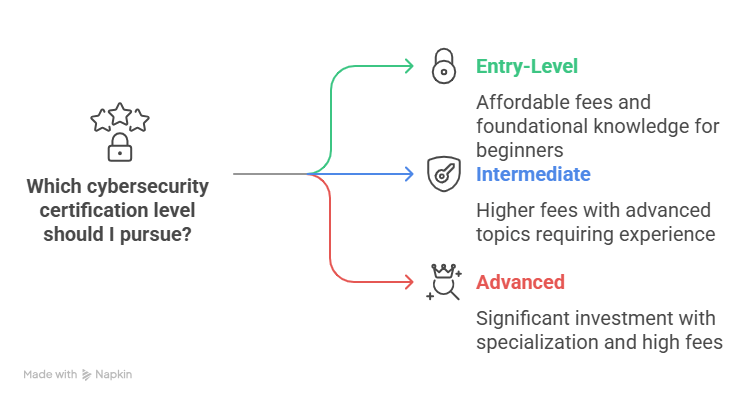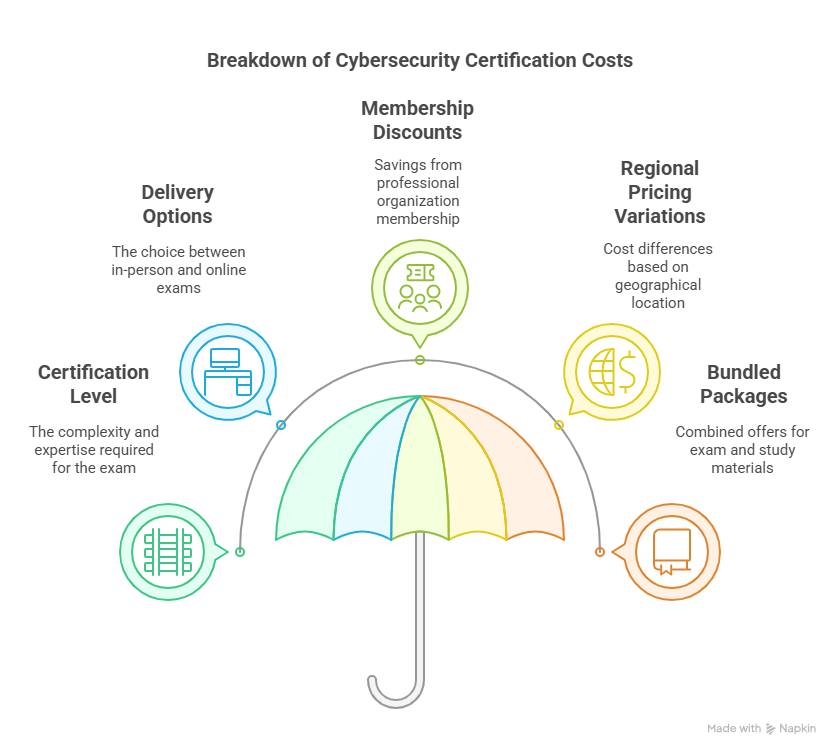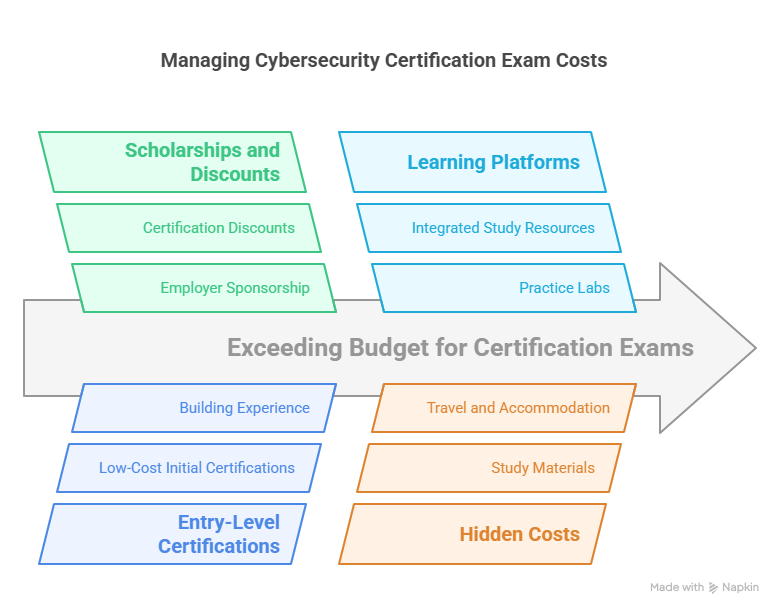Table of Contents
- What Is a Cybersecurity Certification Exam Fee?
- The Importance of Cybersecurity Certifications
- Understanding the Different Levels of Cybersecurity Certifications
- Why Cybersecurity Certification Exam Fees Matter
- Factors That Influence Cybersecurity Certification Exam Fees
- How to Manage Cybersecurity Certification Exam Fees
- How ACSMI Supports Exam Fee Optimization
- Lesser-Known Facts About Cybersecurity Certification Fees
- 5 Frequently Asked Questions About Cybersecurity Certification Exam Fees
The cybersecurity industry continues to experience rapid growth, driven by increasing digital threats and the global shift towards online services. As organizations across all sectors ramp up their cybersecurity efforts, they are seeking skilled professionals to safeguard their networks, data, and systems. To qualify for these roles, many individuals pursue certifications from renowned bodies such as CompTIA, (ISC)², and EC-Council. However, aspiring cybersecurity professionals often overlook one critical aspect of their journey: the cost of Cybersecurity Certification Test exams.
Understanding Cybersecurity Certification Test exam fees is crucial for anyone pursuing a career in this field. Not only do these certifications serve as proof of expertise, but they can also directly influence earning potential and career progression. In this guide, we will explore the various factors that influence exam fees, ways to manage these costs, and strategies to maximize your return on investment.
What Is a Cybersecurity Certification Exam Fee?
The cybersecurity certification exam fee is the amount charged by the certification body to take an exam that validates your skills and knowledge in the field of cybersecurity. These fees typically include the cost of registration and access to the testing portal, but they may not cover additional expenses such as study materials, training courses, or retakes.
The cost of cybersecurity certification exams can vary widely depending on factors such as the certification level, the issuing body, and additional resources like study guides or practice tests. Understanding the fee structure and what is included in the cost is essential to budgeting for your certification journey.
The Importance of Cybersecurity Certifications
Before diving into the specifics of certification exam fees, it’s important to understand why certifications matter in the first place. Cybersecurity certifications validate your expertise, demonstrate your commitment to the field, and can open the door to higher-paying roles and career advancement opportunities.
Certification exams typically test a candidate’s knowledge of industry standards, best practices, and technical skills. Whether you are interested in securing a job as a network security engineer, an ethical hacker, or a security analyst, a certification can serve as a valuable asset that sets you apart from the competition.
Understanding the Different Levels of Cybersecurity Certifications
The cybersecurity certification landscape is diverse, offering a range of options suitable for professionals at various stages of their careers. It’s important to recognize the differences in exam fees based on certification level, as these can have a significant impact on your total investment.

Entry-Level Certifications
Entry-level cybersecurity certifications are designed for individuals who are new to the field. These credentials validate foundational knowledge and provide a stepping stone to more advanced certifications. Examples of popular entry-level certifications include CompTIA Security+, Cisco’s CCNA Security, and Certified Ethical Hacker (CEH) for beginners.
The fees for these certifications are generally more affordable, ranging from $300 to $450. These exams typically focus on basic security concepts such as network security, threat mitigation, and risk management.
Intermediate Certifications
Intermediate certifications are intended for professionals with some experience in cybersecurity. These certifications typically cover more advanced topics and may require practical experience or prior knowledge of basic cybersecurity concepts. Examples of intermediate certifications include Certified Information Systems Security Professional (CISSP), Certified Information Security Manager (CISM), and Certified Cloud Security Professional (CCSP).
The fees for intermediate-level exams generally range from $500 to $700, with additional costs for study materials and training programs.
Advanced Certifications
Advanced certifications are typically pursued by cybersecurity professionals who have several years of experience and want to specialize in a particular area. These certifications are more complex, requiring both in-depth technical knowledge and practical expertise. Examples of advanced certifications include Certified Chief Information Security Officer (CISO), Certified Information Privacy Professional (CIPP), and Certified Threat Intelligence Analyst (CTIA).
These certifications often come with higher exam fees, typically ranging from $700 to $1,000 or more. Advanced certifications are a significant investment, but they can lead to highly lucrative roles in cybersecurity management and leadership.
Why Cybersecurity Certification Exam Fees Matter
The fees associated with cybersecurity certification exams are an important consideration when planning your career path. While the cost of these exams may seem high, the long-term benefits can far outweigh the investment. Cybersecurity professionals with certifications often earn higher salaries and enjoy greater job stability than those without certification.
Factors That Influence Cybersecurity Certification Exam Fees
Several factors can influence the overall cost of a cybersecurity certification exam. Understanding these factors is crucial for effectively budgeting for your certification journey.

1. Certification Level
As discussed earlier, the level of certification is one of the primary factors that determine the cost of the exam. Entry-level exams tend to be less expensive, while advanced certifications come with higher fees due to their complexity and the expertise required.
2. Delivery Options
Cybersecurity certification exams can typically be taken in-person or online. In-person exams often have additional administrative fees, such as travel costs or proctoring fees, whereas online exams may offer more flexibility in terms of scheduling and location. Some organizations also offer hybrid models, which allow candidates to choose between online and in-person testing options.
3. Membership Discounts
Many professional organizations offer discounts on certification exam fees to their members. For example, (ISC)² offers discounts to members of its organization, and ISACA provides similar benefits for those who are part of its network. Membership in these organizations can be an affordable way to reduce your overall certification costs.
4. Regional Pricing Variations
The cost of cybersecurity certification exams can vary based on your geographical location. Many certification bodies adjust their pricing to reflect the local economy or to make exams more affordable in certain regions. For instance, exams in North America may cost more than exams in developing countries.
5. Bundled Packages and Study Materials
Many certification bodies offer bundled packages that include both the exam fee and study materials. These packages can provide significant savings compared to purchasing each component separately. Additionally, some certification bodies offer discounts for retakes or group registrations, which can help you save money if you need to retake the exam or if your organization is certifying multiple employees.
How to Manage Cybersecurity Certification Exam Fees
Managing the cost of It Specialist Cybersecurity Certification exams is essential to ensure you don’t exceed your budget. Below are some practical strategies to reduce your financial burden.

1. Research Scholarships or Discounts
Many organizations provide scholarships, grants, or discounts for those pursuing certifications. Some employers sponsor certification fees for employees as part of professional development programs. Additionally, certain certifications offer reduced fees for students, military personnel, or underrepresented groups.
2. Start with Entry-Level Certifications
If you’re new to the cybersecurity field, starting with an entry-level certification is a great way to manage costs. CompTIA Security+ is an excellent entry-level certification that can help you get started without a significant financial commitment. Once you’ve gained some experience, you can move on to more advanced certifications.
3. Use Comprehensive Learning Platforms
Maximizing your study time and resources is essential to reducing costs. Comprehensive learning platforms like ACSMI offer structured modules and practice labs designed to help you pass your exam the first time. These platforms often include resources that would otherwise require separate purchases, such as study guides, practice tests, and exam simulators.
4. Plan for Hidden Costs
When budgeting for certification exams, it’s important to account for hidden costs that may not be immediately obvious. For instance, you may need to purchase study materials or pay for travel and accommodation if you are required to take the exam in-person. Planning for these additional expenses will help you avoid surprises and ensure you stay within your budget.
How ACSMI Supports Exam Fee Optimization
ACSMI offers a variety of services designed to help candidates reduce the cost of certification preparation. The platform provides an all-in-one resource hub, offering curated learning content that is specifically mapped to the certification you are pursuing. This eliminates the need for multiple subscriptions and resources, saving you money in the long run.
With over 400+ modules covering a range of topics from basic network security to advanced threat management, ACSMI ensures that you are well-prepared for the exam. Additionally, ACSMI’s simulation-based labs provide practical experience that mirrors real-world scenarios, which helps minimize the risk of failure and reduces the likelihood of needing to retake the exam.
Lesser-Known Facts About Cybersecurity Certification Fees
-
Not All Fees Are Set in Stone: While the official certification exam fee is fixed, there are often additional ways to save. Many certification bodies offer discounts to students, veterans, or employees of certain organizations.
-
Group Discounts: If you work for an organization that is looking to certify multiple employees, many organizations offer group discounts, which can help reduce the overall cost.
-
Regional Variations: The cost of certification exams can differ based on where you are located. Some countries, particularly in developing regions, may offer lower fees to make certification more accessible.
-
Scholarships Available: Various organizations, including non-profits and educational institutions, offer scholarships specifically for those pursuing cybersecurity certifications.
-
Some Exams Offer Payment Plans: For high-cost certifications like CISSP, some certification bodies allow candidates to pay exam fees in installments.
-
Bundled Exam and Training Packages: Some certification bodies offer bundled packages that include exam registration, study materials, and practice tests at a discounted rate.
Final Thoughts: Investing Wisely in Your Cybersecurity Career
Understanding the cost of cybersecurity certification exams is an essential part of your career planning. While the fees can be significant, the return on investment is often well worth it. By taking the time to research available resources, explore financial assistance options, and carefully plan your certification journey, you can manage the costs effectively and advance your career in cybersecurity.
Certifications not only validate your skills but also open the door to higher-paying roles and greater career opportunities. Platforms like ACSMI provide comprehensive resources to help you prepare efficiently and reduce the likelihood of needing retakes. Whether you’re just starting with CompTIA Security+ or pursuing advanced certifications like CISSP, careful preparation and wise financial planning will set you on the path to success in the dynamic and rewarding cybersecurity industry.
5 Frequently Asked Questions About Cybersecurity Certification Exam Fees
How much does it cost to prepare for cybersecurity certifications?
The cost of preparing for cybersecurity certifications can vary depending on the resources you use. In addition to the exam fee, you will need to account for study materials, practice tests, and potentially retake fees. Platforms like ACSMI offer all-in-one resources to help minimize these additional costs.
Can I get financial assistance for cybersecurity certifications?
Yes, many organizations offer financial assistance for certification exams. Scholarships, employer sponsorships, and discounts for underrepresented groups are all viable options to help reduce the cost of certification.
What is the cost of entry-level cybersecurity certifications?
Entry-level certifications like CompTIA Security+ typically cost between $300 and $450. These certifications are affordable and serve as excellent entry points into the cybersecurity field.
How can I save money on certification preparation?
Using platforms like ACSMI can help save money by providing all-in-one resources that eliminate the need for separate subscriptions to study guides or practice tests.
Are there payment plans available for exam fees?
Some certification bodies offer payment installment options, particularly for high-cost exams like CISSP. Check with the certification body to see if they offer these flexible payment plans.

Leave a Reply